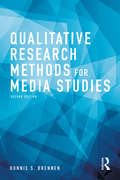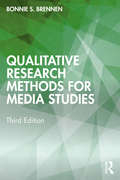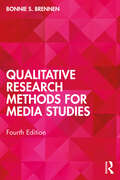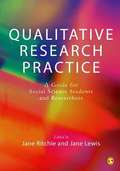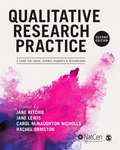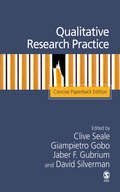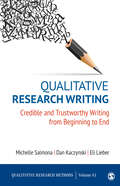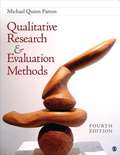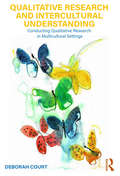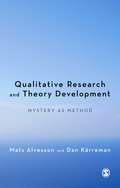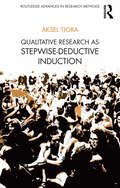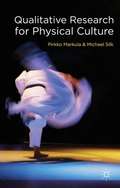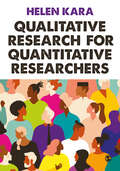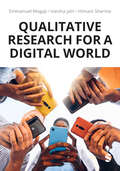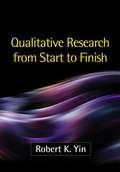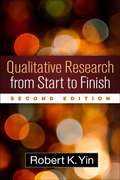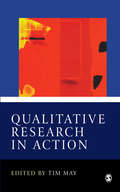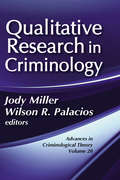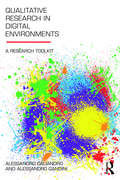- Table View
- List View
Qualitative Research Methods for Media Studies
by Bonnie S. BrennenQualitative Research Methods for Media Studies provides students and researchers with the tools they need to perform critically engaged, theoretically informed research using methods that include interviewing, focus groups, historical research, oral histories, ethnography and participant observation, textual analysis and online research. Each chapter features step-by-step instructions that integrate theory with practice, as well as a case study drawn from published research demonstrating best practices for media scholars. Readers will also find in-depth discussions of the challenges and ethical issues that may confront researchers using a qualitative approach. Qualitative research does not offer easy answers, simple truths or precise measurements, but this book provides a comprehensive and accessible guide for those hoping to explore this rich vein of research methodology. With new case studies throughout, this new edition includes updated material on digital technologies, including discussion of doing online research and using data to give students the tools they need to work in today’s convergent media environment.
Qualitative Research Methods for Media Studies
by Bonnie S. BrennenThis fully updated third edition provides students and researchers with the tools they need to perform critically engaged, theoretically informed research using methods that include interviewing, focus groups, historical research, oral histories, ethnography and participant observation, textual analysis and online research. Each chapter features step-by-step instructions that integrate theory with practice, as well as a case study drawn from published research demonstrating best practices for media scholars. Readers will also find in-depth discussions of the challenges and ethical issues that may confront researchers using a qualitative approach. With new case studies throughout, this third edition also includes updated and expanded material on digital technologies and platforms, how to perform social media research, how to analyse a variety of multimedia texts, and reflections on the use of big data. A comprehensive and accessible guide for those hoping to explore this rich vein of research methodology, this book provides students and scholars with the all tools they need to be able to work in today’s convergent media environment.
Qualitative Research Methods for Media Studies
by Bonnie S. BrennenThis fully updated fourth edition provides students and researchers with the tools they need to perform critically engaged, theoretically informed research using methods that include interviewing, focus groups, historical research, oral histories, textual analysis, ethnography and participant observation, and digital ethnography and netnography.Each chapter features step-by-step instructions that integrate theory with practice, as well as a case study drawn from published research demonstrating best practices for media scholars. Readers will also find in-depth discussions of the challenges and ethical issues that may confront researchers using a qualitative approach. With new case studies and examples throughout, this fourth edition also includes updated and expanded material on performing data analysis, how to analyze and understand research findings, performing social media research, and the use of big data and Artificial Intelligence (A.I.). This includes a brand-new chapter on generative A.I., which examines recent advancements and technological developments, and considers ways qualitative researchers can use it for their research.A comprehensive and accessible guide for those hoping to explore this rich vein of research methodology, this book provides students and scholars with all the tools they need to be able to work with in today’s convergent media environment.
Qualitative Research Methods for the Social Sciences, Eighth Edition
by Bruce L. Berg Howard LuneThis text shows novice researchers how to design, collect, and analyze qualitative data and then present their results to the scientific community. The book stresses the importance of ethics in research and taking the time to properly design and think through any research endeavor.
Qualitative Research Practice
by Jane Ritchie Jane Lewis`An excellent introduction to the theoretical, methodological and practical issues of qualitative research. . . they deal with issues at all stages in a very direct, clear, systematic and practical manner and thus make the processes involved in qualitative research more transparent' - Nyhedsbrev `This is a "how to" book on qualitative methods written by people who do qualitative research for a living. . . . It is likely to become the standard manual on all graduate and undergraduate courses on qualitative methods' - Professor Robert Walker, School of Sociology and Social Policy, University of Nottingham What exactly is qualitative research? What are the processes involved and what can it deliver as a mode of inquiry? Qualitative research is an exciting blend of scientific investigation and creative discovery. When properly executed, it can bring a unique understanding of people's lives which in turn can be used to deepen our understanding of society. It as a skilled craft used by practitioners and researchers in the `real world'; this textbook illuminates the possibilities of qualitative research and presents a sequential overview of the process written by those active in the field. Qualitative Research Practice: - Leads the student or researcher through the entire process of qualitative research from beginning to end - moving through design, sampling, data collection, analysis and reporting. - Is written by practising researchers with extensive experience of conducting qualitative research in the arena of social and public policy - contains numerous case studies. - Contains plenty of pedagogical material including chapter summaries, explanation of key concepts, reflective points for seminar discussion and further reading in each chapter - Is structured and applicable for all courses in qualitative research, irrespective of field. Drawn heavily on courses run by the Qualitative Unit at the National Centre for Social Research, this textbook should be recommended reading for students new to qualitative research across the social sciences.
Qualitative Research Practice: A Guide for Social Science Students and Researchers
by Jane Ritchie Jane Lewis Rachel Ormston Carol McNaughton NichollsWhy use qualitative methods? What kinds of questions can qualitative methods help you answer? How do you actually do rigorous and reflective qualitative research in the real world? Written by a team of leading researchers associated with NatCen Social Research (the National Centre for Social Research) this textbook leads students and researchers through the entire process of qualitative research from beginning to end - moving through design, sampling, data collection, analysis and reporting. In this fully revised second edition you will find: A practical account of how to carry out qualitative research which recognises a range of current approaches and applications A brand new chapter on ethics A brand new chapter on observational research Updated advice on using software when analysing your qualitative data New case studies which illustrate issues you may encounter and how problems have been tackled by other researchers. This book is an ideal guide for students, practitioners and researchers faced with the challenges of doing qualitative research in both applied and academic settings in messy real-life contexts.
Qualitative Research Practice: Concise Paperback Edition
by David Silverman Clive Seale Giampietro Gobo Jaber F. Gubrium'This book is jam-packed with a wide range of material related to qualitative research.... [T]his is a quality text and has much to offer the reader, especially the novice researcher' - Nurse Researcher `This comprehensive collection of almost 40 chapters - each written by a leading expert in the field - is the essential reference for anyone undertaking or studying qualitative research. It covers a diversity of methods and a variety of perspectives and is a very practical and informative guide for newcomers and experienced researchers alike' - John Scott, University of Essex `The best ways in which to understand the issues and processes informing qualitative research is to learn from the accounts of its leading practitioners. Here they come together in what is a distinctive and wide-ranging collection that will appeal to postgraduates and social researchers in general' - Tim May, University of Salford `This excellent guide engages in a dialogue with a wide range of expert qualitative researchers, each of whom considers their own practice in an illuminating and challenging way. Overall, the book constitutes an authoritative survey of current methods of qualitative research data collection and analysis' - Nigel Gilbert, University of Surrey This concise paperback edition of the best selling handbook, Qualitative Research Practice, is particularly aimed at the student reader. The chapters are written by leading, internationally distinguished qualitative researchers who recount and reflect on their own research experiences as well as others, past and present, from whom they have learned. It demonstrates the benefits of using particular methods from the viewpoint of real-life experience. This is also a good philosophy for students to adopt in planing research work: to begin from a practical conception of the research process and to treat a book like this as an opportunity to learn a valuable craft. From the outside, good research seems to be produced through practitioners learning and following standard theoretical, empirical and procedural formats. But from the inside we learn that qualitative research (like other forms of scientific endeavour) is also a biographical engagement, rendering its scholarly and practical contributions in its own terms. Standards take on practical meaning as the distinct activities of qualitative research resonate throughout the enterprise, complicating its accountability to itself and to others. In an authoritative yet accessible manner, Qualitative Research Practice reveals the special features of this engagement, teaching us that qualitative research is as much a craft and practice as it is a way of knowing. Presenting a comprehensive examination of contemporary and traditional varieties of qualitative research practice, Qualitative Research Practice will be an invaluable resource for advanced students and researchers in any discipline. It is an essential and definitive guide to the major forms of qualitative methods in use today, written by leaders in the relevant fields of research practice.
Qualitative Research Using Social Media
by Joel Rasmussen Gwen BouvierDo you want to study influencers? Opinions and comments on a set of posts? Look at collections of photos or videos on Instagram? Qualitative Research Using Social Media guides the reader in what different kinds of qualitative research can be applied to social media data. It introduces students, as well as those who are new to the field, to developing and carrying out concrete research projects. The book takes the reader through the stages of choosing data, formulating a research question, and choosing and applying method(s). Written in a clear and accessible manner with current social media examples throughout, the book provides a step-by-step overview of a range of qualitative methods. These are presented in clear ways to show how to analyze many different types of social media content, including language and visual content such as memes, gifs, photographs, and film clips. Methods examined include critical discourse analysis, content analysis, multimodal analysis, ethnography, and focus groups. Most importantly, the chapters and examples show how to ask the kinds of questions that are relevant for us at this present point in our societies, where social media is highly integrated into how we live. Social media is used for political communication, social activism, as well as commercial activities and mundane everyday things, and it can transform how all these are accomplished and even what they mean. Drawing on examples from Twitter, Instagram, YouTube, TikTok, Facebook, Snapchat, Reddit, Weibo, and others, this book will be suitable for undergraduate students studying social media research courses in media and communications, as well as other humanities such as linguistics and social science-based degrees.
Qualitative Research Writing: Credible and Trustworthy Writing from Beginning to End (Qualitative Research Methods)
by Dan Kaczynski Michelle Salmona Eli LieberFinding your academic voice to tell a strong story about your research is a difficult hurdle for many qualitative writers. Qualitative Research Writing: Credible and Trustworthy Writing from Beginning to End takes you through the writing process, starting with how you think about your research and building towards presenting credible and trustworthy work. Authors Michelle Salmona, Dan Kaczynski, and Eli Lieber offer practical guidance based on over two decades working with faculty and doctoral students. By integrating digital tools and qualitative research steps into the writing process, readers will seamlessly move from the research process to writing. This brief text will help writers make sound arguments and develop their authorial voices to build connections between themselves and their intended audience.
Qualitative Research Writing: Credible and Trustworthy Writing from Beginning to End (Qualitative Research Methods)
by Dan Kaczynski Michelle Salmona Eli LieberFinding your academic voice to tell a strong story about your research is a difficult hurdle for many qualitative writers. Qualitative Research Writing: Credible and Trustworthy Writing from Beginning to End takes you through the writing process, starting with how you think about your research and building towards presenting credible and trustworthy work. Authors Michelle Salmona, Dan Kaczynski, and Eli Lieber offer practical guidance based on over two decades working with faculty and doctoral students. By integrating digital tools and qualitative research steps into the writing process, readers will seamlessly move from the research process to writing. This brief text will help writers make sound arguments and develop their authorial voices to build connections between themselves and their intended audience.
Qualitative Research and Evaluation Methods: Integrating Theory and Practice
by Michael Quinn PattonDrawing on more than 40 years of experience conducting applied social science research and program evaluation, author Michael Quinn Patton has crafted the most comprehensive and systematic book on qualitative research and evaluation methods, inquiry frameworks, and analysis options available today. Now offering more balance between applied research and evaluation, this Fourth Edition of Qualitative Research & Evaluation Methods illuminates all aspects of qualitative inquiry through new examples, stories, and cartoons; more than a hundred new summarizing and synthesizing exhibits; and a wide range of new highlight sections/sidebars that elaborate on important and emergent issues. For the first time, full case studies are included to illustrate extended research and evaluation examples. In addition, each chapter features an extended "rumination," written in a voice and style more emphatic and engaging than traditional textbook style, about a core issue of persistent debate and controversy.
Qualitative Research and Intercultural Understanding: Conducting Qualitative Research in Multicultural Settings
by Deborah CourtQualitative Research and Intercultural Understanding: Conducting Qualitative Research in Multicultural Settings makes an important contribution to the fields of multiculturalism and qualitative research methods. The first section of the book is a textbook on qualitative methodology. Beginning with a sketch of the historical roots of qualitative research and its place in the research landscape, the book then explores the notion of culture and our individual and collective experiences of culture. The chapters that follow explain how to frame a study and ask qualitative research questions, how to strengthen the trustworthiness of qualitative findings and how to collect and analyze data and write a research report. This section closes with a chapter on research ethics. Every chapter is infused with the idea of researcher reflectivity in order to see beyond the researcher's personal cultural worldview. Examples of research studies are provided in every chapter, and each chapter concludes with questions and exercises for critical thought. The second section of the book is comprised of five contributed chapters in which researchers describe their own challenges in conducting research in multicultural settings. Graduate students, experienced researchers and all those interested in multiculturalism will find something to learn and enjoy in this vivid and unusual book.
Qualitative Research and Theory Development: Mystery as Method
by Mats Alvesson Dan KärremanEmpirical data is one of the cornerstones of knowledge in the social sciences, and yet the researcher often takes it for granted, reserving his or her imaginative faculties for finding a theory that ′fits the data′. This revealing account of the theory-data relationship calls this faith in data into question and establishes a reflexive framework and vocabulary to explore the creative, political and philosophical elements of data production. Rather than thinking about the theory-data ′fit′, Alvesson and Karreman will encourage you to consider the research process as one of theory-data interplay, asking if creative empirical material can challenge established theory and inspire new lines of development, and if breakdowns and mysteries encountered in research can be a constructive rather than destructive process. They will encourage you to think critically about empirical data in terms of construction rather than verification, and most importantly they will encourage you to develop theory that is interesting and novel, rather than naive or irrelevant, making this title essential reading for those who often find the traditional vocabulary and frameworks of social science research obvious or simplistic.
Qualitative Research as Stepwise-Deductive Induction (Routledge Advances in Research Methods)
by Aksel TjoraThis book provides thorough guidance on various forms of data generation and analysis, presenting a model for the research process in which detailed data analysis and generalization through the development of concepts are central. Based on an inductive principle, which begins with raw data and moves towards concepts or theories through incremental deductive feedback loops, the ‘stepwise-deductive induction’ approach advanced by the author focuses on the analysis phase in research. Concentrating on creativity, structuring of analytical work, and collaborative development of generic knowledge, it seeks to enable researchers to extend their insight of a subject area without having personally to study all the data generated throughout a project. A constructive alternative to Grounded Theory, the approach advanced here is centred on qualitative research that aims at developing concepts, models, or theories on basis of a gradual paradigm to reduce complexity. As such, it will appeal to scholars and students across the social sciences with interests in methods and the analysis of qualitative data of various kinds.
Qualitative Research for Physical Culture
by Michael Silk Pirkko MarkulaThis book provides a guide to qualitative research methods in the multidisciplinary field of physical culture. Developing an approach based on the '7 Ps' of research, this text navigates a pathway through the research process that will be invaluable as a teaching tool and to experienced and inexperienced researchers alike.
Qualitative Research for Quantitative Researchers
by Helen KaraApproaching qualitative research for the first time and unsure how to get started? This book captures what you need to know to jump into effective qualitative or mixed methods research. The book gets you up to speed on the specifics of qualitative research, while showing how it complements quantitative research and how to draw on and hone your existing skills to conduct impactful research. It covers the whole research process, from explaining what theories are for and planning your research design, through gathering and working with your data, to developing good practice in research reporting and dissemination. The book also: • Showcases the value of qualitative research, helping you understand its relevance, credibility and validity. • Grapples with how to decolonise your approach, do research in an ethical and inclusive way, and debias your thinking. • Challenges you to rethink how you conduct research and choose the most appropriate methods for your project. Giving you a fuller understanding of methods and methodologies to benefit your work regardless of the approach you choose, this book encourages you to discover the joy of qualitative research.
Qualitative Research for Quantitative Researchers
by Helen KaraApproaching qualitative research for the first time and unsure how to get started? This book captures what you need to know to jump into effective qualitative or mixed methods research. The book gets you up to speed on the specifics of qualitative research, while showing how it complements quantitative research and how to draw on and hone your existing skills to conduct impactful research. It covers the whole research process, from explaining what theories are for and planning your research design, through gathering and working with your data, to developing good practice in research reporting and dissemination. The book also: • Showcases the value of qualitative research, helping you understand its relevance, credibility and validity. • Grapples with how to decolonise your approach, do research in an ethical and inclusive way, and debias your thinking. • Challenges you to rethink how you conduct research and choose the most appropriate methods for your project. Giving you a fuller understanding of methods and methodologies to benefit your work regardless of the approach you choose, this book encourages you to discover the joy of qualitative research.
Qualitative Research for a Digital World: A Practical Guide
by Emmanuel Mogaji Varsha Jain Himani SharmaDo you want to understand and apply qualitative research methods in a digital context? This book will help you navigate the complexities of digital access and fluency, ensuring a broad lens on research methodologies. From step-by-step guides to innovative frameworks, each chapter is crafted to give you the confidence to carry out cutting-edge qualitative research. This book will provide you with · The knowledge you need to advance your qualitative research understanding across all disciplines. · A practical reflection of the application of relevant research methodologies. · An overview of research ideas, cases, and examples. With a wealth of exercises and examples, this book will become a reference point for qualitative research in the digital context by adopting a case-in-point approach for students across all social science disciplines.
Qualitative Research for a Digital World: A Practical Guide
by Emmanuel Mogaji Varsha Jain Himani SharmaDo you want to understand and apply qualitative research methods in a digital context? This book will help you navigate the complexities of digital access and fluency, ensuring a broad lens on research methodologies. From step-by-step guides to innovative frameworks, each chapter is crafted to give you the confidence to carry out cutting-edge qualitative research. This book will provide you with · The knowledge you need to advance your qualitative research understanding across all disciplines. · A practical reflection of the application of relevant research methodologies. · An overview of research ideas, cases, and examples. With a wealth of exercises and examples, this book will become a reference point for qualitative research in the digital context by adopting a case-in-point approach for students across all social science disciplines.
Qualitative Research from Start to Finish
by Robert YinThis lively, practical text presents a fresh and comprehensive approach to doing qualitative research. The book offers a unique balance of theory and clear-cut choices for customizing every phase of a qualitative study. A scholarly mix of classic and contemporary studies from multiple disciplines provides compelling, field-based examples of the full range of qualitative approaches. Readers learn about adaptive ways of designing studies, collecting data, analyzing data, and reporting findings. Key aspects of the researcher's craft are addressed, such as fieldwork options, the five phases of data analysis (with and without using computer-based software), and how to incorporate the researcher's "declarative" and "reflective" selves into a final report. Ideal for graduate-level courses, the text includes Discussions of ethnography, grounded theory, phenomenology, feminist research, and other approaches. Instructions for creating a study bank to get a new study started. End-of-chapter exercises and a semester-long, field-based project. Quick study boxes, research vignettes, sample studies, and a glossary. Previews for sections within chapters, and chapter recaps. Discussion of the place of qualitative research among other social science methods, including mixed methods research.
Qualitative Research from Start to Finish, Second Edition
by Robert K. YinThis book will help readers understand the practice of qualitative research--whether they want to do it, teach it, or just learn about it. All the major research phases are encompassed (startup, design, data collection, analysis, and composing), including newly emerging trends. Numerous easy-to-read vignettes show how other scholars have successfully implemented specific procedures. Equally distinctive, the book presents qualitative research as an adaptive craft. The array of choices among different procedures and methods enables readers to customize their own studies and to accommodate different worldviews and genres. New to This Edition: *Stronger discussion of different worldviews (e.g., constructivism, postpositivism, and pragmatism) and how they relate to different methodological choices. *Clearer emphasis on doing a generalized qualitative study, while acknowledging 12 specialized genres (e.g., action-based research, arts-based research, autoethnography, grounded theory, phenomenology, and others). *Expanded discussions of different kinds of qualitative study samples and of mixed methods. *New ideas on how to avoid getting stalled when analyzing qualitative data. *Consideration of an additional way of concluding a qualitative study: by taking action. Pedagogical Features: *Chapters start with an abstract and end with a suggested exercise. *Key terms and concepts appear in boldface throughout the text and are listed in end-of-chapter recaps as well as in the book's glossary. *Sections within each chapter start with a preview box: "What you should learn from this section." *An appendix presents a semester- or yearlong field-based project.
Qualitative Research in Action
by Tim May`This delightful book will be important to those researchers eager to extend their knowledge of qualitative research generally but specifically those keen to extend their research practice from a social-science perspective' - Nurse Researcher `This is an excellent collection at the cutting edge of thinking about qualitative research.... The breadth of coverage and the sophistication of the discussion make this an important addition to the increasing literature on qualitative work' - Jonathan Potter, Loughborough University `This book is likely to have a broad appeal to a rising generation of qualitative researchers seeking to relate theoretical debates to methodological practice' - Clive Seale, Goldsmiths College This exciting new book brings together contributions from world-leading scholars as well as younger researchers and focuses on cutting-edge issues related to the practice of qualitative research in the field. It provides a forum for contributors to discuss the issues and processes which inform qualitative research in its various forms as based on fieldwork experiences. In achieving this in an accessible manner to both practising students and researchers, it seeks to enable a dialogue over ideas and provide the reader with a `state of the art' overview of the topic from a contemporary perspective. Rather than being a `how to do' book, this volume should prove vitally useful for advanced students and researchers who wish to engage with those ideas and practices in terms of their applicability for an understanding and explanation of the place of qualitative research in the social sciences. It is also a forum in which leading scholars make an original contribution to the subject. Lively and highly readable throughout, Qualitative Research in Action will be essential reading for advanced undergraduates and above in a variety of disciplines, as well as researchers who wish to engage with contemporary ideas and practices in relation to qualitative research.
Qualitative Research in Criminology: Advances in Criminological Theory (Advances In Criminological Theory Ser.)
by Wilson R. Palacios"This volume investigates the significant role qualitative research plays in expanding and refining our understandings of crime and justice. It features seventeen original essays that discuss the relationship between methodology and theory. The result is a theoretically engaged volume that explores the approaches of qualitative scholars in the collection and treatment of data in criminological scholarship.Among the key issues addressed in the volume are methodological rigor in qualitative research; movement between method, theory building, theoretical refinement and expansion; diversity of qualitative methodologies, from classic field research to contemporary innovations; and considerations of the future of qualitative criminological research.Qualitative research use has expanded rapidly in the last twenty years. This latest volume of Advances in Criminological Theory presents a cogent appraisal of qualitative criminology and the ways in which rigorous qualitative research contributes to theorizing about crime and justice."
Qualitative Research in Criminology: Cutting-Edge Methods
by Mary Dodge Rita FariaThis volume introduces innovative and inspired qualitative methods through topics on crime commission, victimisation and crime control. It highlights how qualitative methods offer significant insights that frame our understanding of the narratives, events, theoretical perspectives, and realities of the social world.This book includes chapters discussing cutting-edge methods, which demonstrate how qualitative research can expand beyond traditional approaches. It offers diversity in research, including gender, race, and geographic sensitivities. The volume addresses a multitude of approaches for using qualitative methodologies, including innovative uses of technology mediums—such as social media, participatory videos, Zoom interviewing, and photographic visual methods—as means of collecting and co-producing relevant data on meaning. Ultimately, this book illustrates how qualitative criminology allows for deeper and more nuanced understandings of local and regional specificities in a globalized world, and how social interactions are influenced by individual interpretations, social interactions, and collective decision making.This volume is an essential read for graduate students and researchers in criminology and other social science disciplines interested in qualitative empirical research and informed policy making.
Qualitative Research in Digital Environments: A Research Toolkit
by Alessandro Gandini Alessandro CaliandroThis book offers a toolkit of methods and technologies to undertake qualitative research on digital spaces. Unlike commonly used traditional methodological strategies, which are ‘retrofitted’ to digital spaces, Qualitative Research in Digital Environments offers researchers a set of ‘digitally native’ tools that are designed for online social environments. Thanks to a broad range of cases including Louis Vuitton, YouTube and the concept of ‘hipsterism’, this text illustrates the practical applications of techniques and tools over the most popular social media environments. This book will be a valuable guide to qualitative research for marketing students, researchers and practitioners, as well as a central reference point for tutors in the growing field of Digital Sociology.
